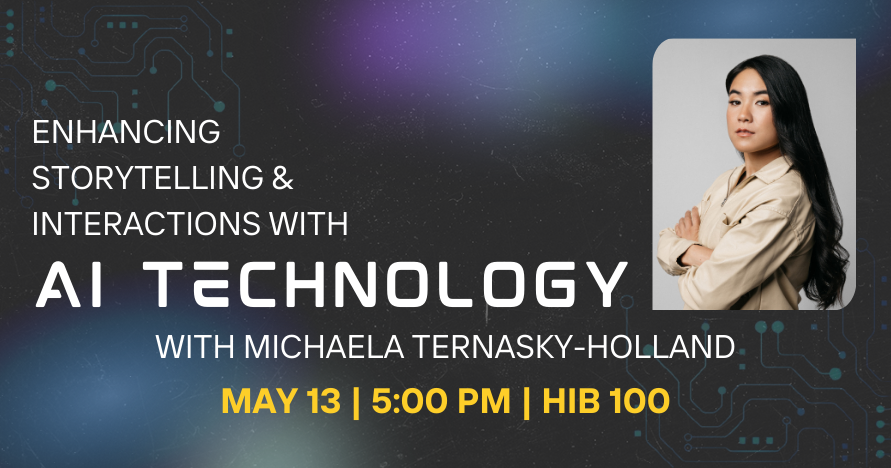## Is AI About to Rewrite the Rules of Storytelling?
We’ve all felt it – that jolt of immersion when a game character delivers a line that feels truly human, or an unexpected twist in the plot that leaves us gasping. What if, in the future, these moments of genuine emotional connection weren’t just the work of talented writers, but the result of sophisticated AI algorithms?

At the University of California, Irvine, the School of Humanities is pushing the boundaries of what’s possible in interactive storytelling. They’re exploring the potential of AI to not just power narratives, but to co-create them, leading to truly dynamic and personalized gaming experiences.
Join us as we delve into UCI’s groundbreaking research and uncover how AI might be the key to unlocking a new era of immersive storytelling in games. From adaptive dialogue to AI-driven character development, get ready to explore the future of interactive fiction.The Ethics of AI in Storytelling: Navigating Uncharted Territory
AI Bias and Representation
As AI algorithms learn from vast datasets, they can inadvertently perpetuate existing societal biases. This raises serious concerns for representation and diversity in storytelling. If AI-generated narratives reflect the biases present in the training data, they can reinforce harmful stereotypes and contribute to the marginalization of underrepresented groups.
For example, an AI trained on a dataset of predominantly male-authored fantasy novels might generate stories with a lack of female characters or portray women in stereotypical roles. Addressing this challenge requires careful curation of training data, ongoing monitoring for bias, and the development of techniques to mitigate its impact.
Ownership and Authorship
The rise of AI in creative fields has sparked debate about the nature of authorship and intellectual property. Who owns the copyright to an AI-generated story? Is it the programmer who created the AI, the person who provided the initial prompt, or the AI itself? These questions have no easy answers and require careful consideration of legal and ethical frameworks.
Current copyright law generally grants authorship to human creators. However, as AI becomes more sophisticated, this may need to be re-evaluated. The legal landscape is evolving, with ongoing discussions about whether AI should be granted certain intellectual property rights.
The Future of Human Connection in Interactive Narratives
AI has the potential to transform how we interact with stories, creating more immersive and personalized experiences. AI-powered chatbots can engage in dialogue with players, adapting the narrative based on their choices. AI can also generate procedurally generated content, ensuring that each playthrough is unique.
However, there are concerns that over-reliance on AI could erode the human element of storytelling. If players are constantly interacting with AI-generated characters, they may lose the sense of connection with real human creators and performers. It’s crucial to find a balance between leveraging AI’s capabilities and preserving the essential qualities that make storytelling so powerful.
Gamestanza’s Perspective: Integrating AI into Interactive Experiences
AI as a Game Changer
At Gamestanza, we believe that AI has the potential to revolutionize interactive experiences. AI can empower developers to create more dynamic, responsive, and engaging games. By incorporating AI, we can push the boundaries of what’s possible in storytelling, gameplay, and player interaction.
Imagine a game where the narrative evolves based on your choices, where characters react realistically to your actions, and where the world itself feels alive and responsive. AI can make these visions a reality.
Case Studies in AI-Powered Gaming
We’re already seeing successful examples of AI integration in gaming. “Journey”, a critically acclaimed adventure game, utilizes AI to control the behavior of non-player characters (NPCs), creating a sense of emergent gameplay and emotional connection.
“The Last of Us Part II” employs AI to generate realistic enemy behavior, making combat encounters more challenging and immersive.
These are just a few examples of how AI is transforming the gaming landscape.
The Gamestanza Advantage
Gamestanza is uniquely positioned to leverage the power of AI. Our platform provides developers with the tools and infrastructure they need to integrate AI seamlessly into their games. We’re committed to fostering a community of developers who are pushing the boundaries of what’s possible with AI in interactive storytelling.
Here’s how Gamestanza empowers developers to embrace AI:
- AI-Powered Game Engines: Our platform offers access to cutting-edge AI game engines that simplify the development process and provide developers with pre-built AI modules for tasks such as character animation, dialogue generation, and procedural content creation.
- Community Resources: Gamestanza fosters a thriving community of developers who share knowledge, best practices, and AI models. This collaborative environment accelerates innovation and helps developers overcome challenges.
- AI Training and Support: We provide comprehensive training and support resources to help developers understand and utilize AI effectively in their games.
By leveraging these resources, developers can create truly innovative and immersive AI-powered games that captivate players and redefine the boundaries of interactive storytelling.
Conclusion
The UCI School of Humanities is breaking new ground, demonstrating how AI technology can be a powerful tool for enriching storytelling and player interactions in games. By exploring techniques like dynamic narrative generation and personalized AI companions, researchers are pushing the boundaries of what’s possible in interactive entertainment. This shift towards AI-driven narratives holds immense significance for the future of gaming. Imagine games that adapt to your choices, crafting unique experiences tailored to your playstyle and preferences. Picture AI companions that evolve alongside you, learning your personality and providing truly meaningful interactions. This isn’t just about adding a layer of complexity; it’s about creating a more immersive, personal, and ultimately, more compelling gaming experience. As AI technology continues to advance, we stand on the precipice of a new era in gaming, where the lines between player and story blur, and the possibilities for creative expression are truly limitless. The future of games is interactive, adaptive, and deeply personal – a future where AI empowers us to become not just players, but active participants in the stories we love.
